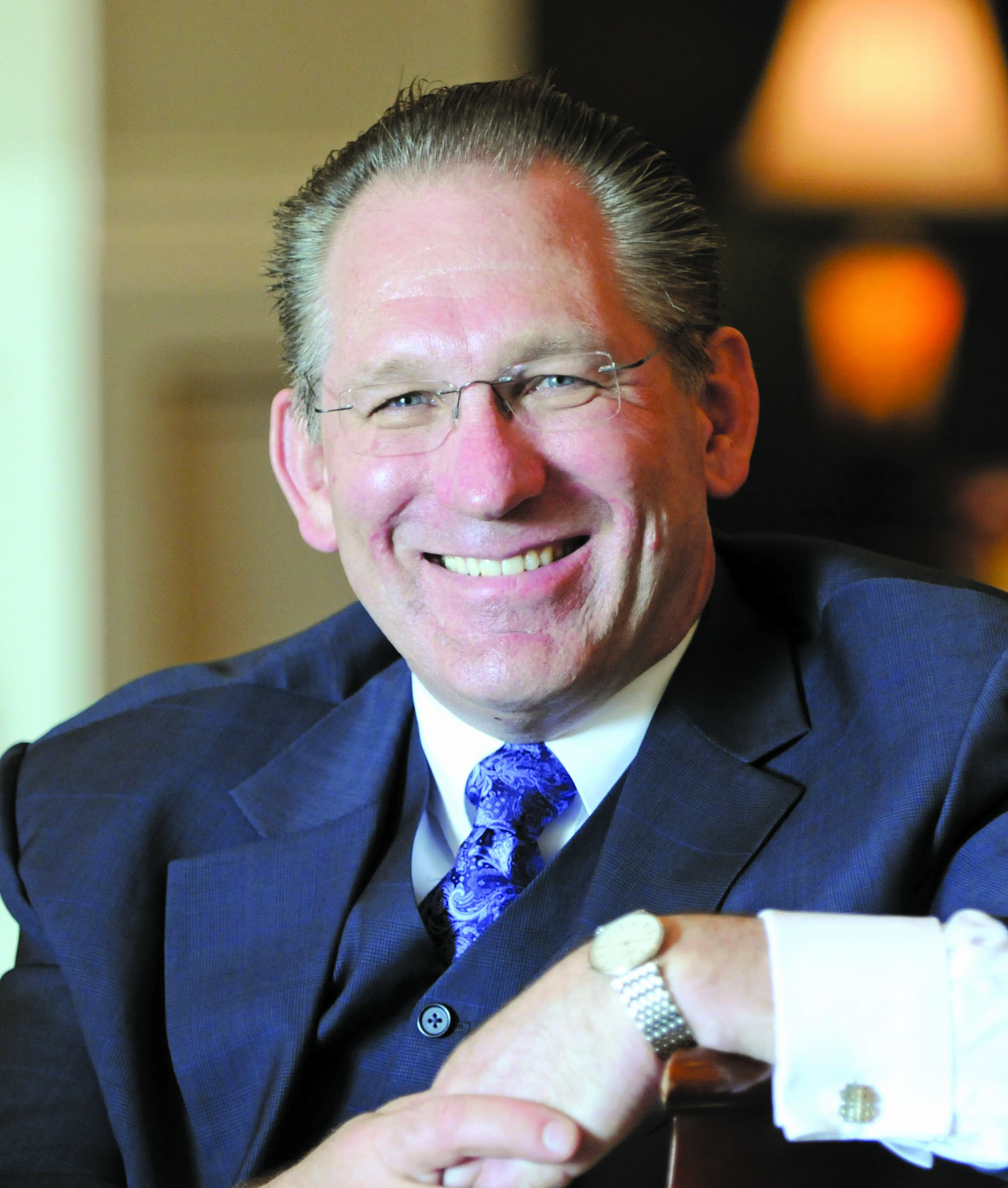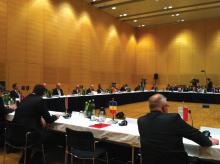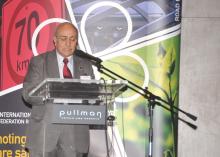Road safety, funding and financing will be among the key issues on the table at the inaugural IRF - Roads Australia Regional Conference for Asia and Australasia, to be held in Sydney from May 4th - 6th, 2015. The Conference coincides with UN Global Road Safety Week, with safer roads, worksites and driver behaviour being a central focus of discussions. Speakers from across the Asia Pacific are expected to share learnings and experiences in tackling regional road safety and the challenges and opportunities fo

Jack Opiola, managing partner of international road usage charging consultancy, D’Artagnan Consulting, is chairing a session on road user charging
Road safety, funding and financing will be among the key issues on the table at the inaugural IRF - Roads Australia Regional Conference for Asia and Australasia, to be held in Sydney from May 4th - 6th, 2015
The Conference coincides with UN Global Road Safety Week, with safer roads, worksites and driver behaviour being a central focus of discussions. Speakers from across the Asia Pacific are expected to share learnings and experiences in tackling regional road safety and the challenges and opportunities for meeting the UN’s 2020 goal of stabilising and reducing the forecast level of road traffic fatalities around the world.
The Conference program will also explore innovative and value-for-money approaches to funding and financing, asset maintenance, ITS, pavements and materials, and sustainability. The Conference host nation, Australia, has been making headway in recent years in developing and delivering strategies to successfully reduce its road toll. In 2014, Australia’s national toll of 1155 deaths was down 3.1% on the previous year, and at its lowest level since 1945. At the same time, the road deaths/100,000 people ratio was 4.87 – the lowest figure ever recorded. Nonetheless, road trauma continues to costs the Australian economy an estimated $27 billion/year.
6194 Roads Australia chief executive, Ian Webb, credits the recent success in cutting the national road toll to a mixture of stronger and more visible law enforcement, better vehicles and ongoing improvements to the nation’s road infrastructure. But he says despite the recent downward trend in road fatalities, governments, industry and the community in Australia are not resting on their laurels. “One of the key policy goals of Roads Australia this year is to work with our key stakeholders to address safety around roadside worksites,” Webb said.
“This is one area of road safety that we still haven’t got the measure of here in Australia.
“In making road safety such an integral part of our Conference programme, we hope regional governments will come and share with us the lessons and successes they’ve had in addressing their own road safety challenges.”
The1201 IRF Geneva has a similar commitment to road safety, and is seeing the Sydney Conference as an opportunity to share best practice approaches and shine a spotlight on the importance of road safety and the UN Decade of Action goal. On the funding and financing front, road-usage charging (RUC) will also be squarely on the agenda at this year’s Conference.
Jack Opiola, managing partner of international road usage charging consultancy, D’Artagnan Consulting, will chair a session on RUC. Opiola has been working with a number of jurisdictions in the US and elsewhere to implement RUC schemes, including the US States of Oregon, Washington, Indiana and California.
In July this year, Oregon will begin to unroll a pay/distance trial with 5,000 volunteer motorists – the first of its type in the United States. Elsewhere, California - facing an annual $5.9 billion backlog in state highway repairs - has recently enacted legislation to start a pilot of its own.
Washington has studied road usage charging over the past three years and is moving to a demonstration test that may also test inter-jurisdictional exchanges of mileage information and interoperability between states.
Opiola said that these initiatives are indicative of the momentum building for RUC as more and more governments look for innovative ways to fund road maintenance, upkeep and construction of new infrastructure. “Here in the United States, federal and state governments do not have enough funding to sufficiently maintain and operate, much less expand, a modern highway system,” he said. “Some states are propping up their transportation funding with portions of their general sales taxes (GST), while others are addressing it with the addition of new sales tax on everything from restaurant bills to haircuts. Still others have raised transportation taxes or proposed increases in public private partnerships (PPPs) and toll roads.”
The solution, he said, is much simpler and fundamentally appeals to the public’s sense of fairness. “Put simply, the public believes it is more equitable for taxpayers to pay for infrastructure based on what they use, not on what they earn, or what they own or drive,” Opiola said. “If there is one advantage the transportation sector holds over other government programs that depend on income, property or sales taxes to fund their services, it is the ability for roadways to be self-funding through direct user fees. It is a fairer, more equitable and sustainable system – the more you use, the more you pay.”
For the RUC session at the Sydney Conference in May, Opiola will be joined by senior state leaders who are currently leading the debate in the US and New Zealand. “In its region, New Zealand is ahead of the game in this space. It has a well-established RUC scheme applying to commercial and diesel vehicles,” Opiola said. “In Australia, the debate is still in its relative infancy. The same external funding pressures apply there as in every other country. RUC is increasingly being talked about as one of a range of solutions that need to be thoroughly investigated.”
The Australian Productivity Commission published an independent report last year that not only recommended a move to a distance-based charging system, but also recommended a pilot test in Australia to evaluate the concept.
Early bird registration for the IRF – RA. Regional Conference closes on March 13th. To register or find out more about the program and the accompanying exhibition, go to %$Linker:2 External <?xml version="1.0" encoding="utf-16"?><dictionary /> 0 0 0 oLinkExternal www.irfnet.ch Visit IRF Geneva Website false http://www.irfnet.ch/ false false %>
The Conference coincides with UN Global Road Safety Week, with safer roads, worksites and driver behaviour being a central focus of discussions. Speakers from across the Asia Pacific are expected to share learnings and experiences in tackling regional road safety and the challenges and opportunities for meeting the UN’s 2020 goal of stabilising and reducing the forecast level of road traffic fatalities around the world.
The Conference program will also explore innovative and value-for-money approaches to funding and financing, asset maintenance, ITS, pavements and materials, and sustainability. The Conference host nation, Australia, has been making headway in recent years in developing and delivering strategies to successfully reduce its road toll. In 2014, Australia’s national toll of 1155 deaths was down 3.1% on the previous year, and at its lowest level since 1945. At the same time, the road deaths/100,000 people ratio was 4.87 – the lowest figure ever recorded. Nonetheless, road trauma continues to costs the Australian economy an estimated $27 billion/year.
“This is one area of road safety that we still haven’t got the measure of here in Australia.
“In making road safety such an integral part of our Conference programme, we hope regional governments will come and share with us the lessons and successes they’ve had in addressing their own road safety challenges.”
The
Jack Opiola, managing partner of international road usage charging consultancy, D’Artagnan Consulting, will chair a session on RUC. Opiola has been working with a number of jurisdictions in the US and elsewhere to implement RUC schemes, including the US States of Oregon, Washington, Indiana and California.
In July this year, Oregon will begin to unroll a pay/distance trial with 5,000 volunteer motorists – the first of its type in the United States. Elsewhere, California - facing an annual $5.9 billion backlog in state highway repairs - has recently enacted legislation to start a pilot of its own.
Washington has studied road usage charging over the past three years and is moving to a demonstration test that may also test inter-jurisdictional exchanges of mileage information and interoperability between states.
Opiola said that these initiatives are indicative of the momentum building for RUC as more and more governments look for innovative ways to fund road maintenance, upkeep and construction of new infrastructure. “Here in the United States, federal and state governments do not have enough funding to sufficiently maintain and operate, much less expand, a modern highway system,” he said. “Some states are propping up their transportation funding with portions of their general sales taxes (GST), while others are addressing it with the addition of new sales tax on everything from restaurant bills to haircuts. Still others have raised transportation taxes or proposed increases in public private partnerships (PPPs) and toll roads.”
The solution, he said, is much simpler and fundamentally appeals to the public’s sense of fairness. “Put simply, the public believes it is more equitable for taxpayers to pay for infrastructure based on what they use, not on what they earn, or what they own or drive,” Opiola said. “If there is one advantage the transportation sector holds over other government programs that depend on income, property or sales taxes to fund their services, it is the ability for roadways to be self-funding through direct user fees. It is a fairer, more equitable and sustainable system – the more you use, the more you pay.”
For the RUC session at the Sydney Conference in May, Opiola will be joined by senior state leaders who are currently leading the debate in the US and New Zealand. “In its region, New Zealand is ahead of the game in this space. It has a well-established RUC scheme applying to commercial and diesel vehicles,” Opiola said. “In Australia, the debate is still in its relative infancy. The same external funding pressures apply there as in every other country. RUC is increasingly being talked about as one of a range of solutions that need to be thoroughly investigated.”
The Australian Productivity Commission published an independent report last year that not only recommended a move to a distance-based charging system, but also recommended a pilot test in Australia to evaluate the concept.
Early bird registration for the IRF – RA. Regional Conference closes on March 13th. To register or find out more about the program and the accompanying exhibition, go to %$Linker:







